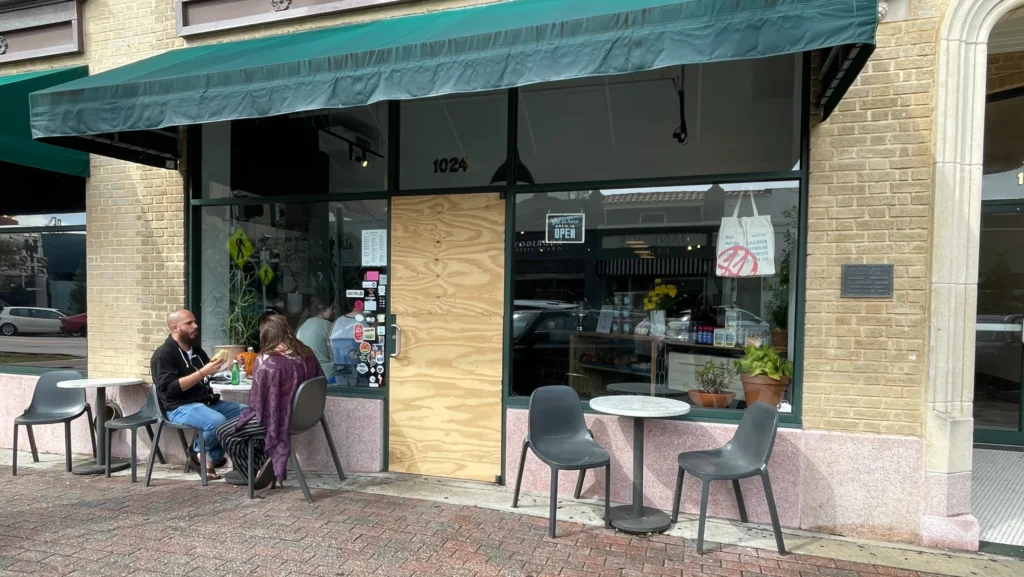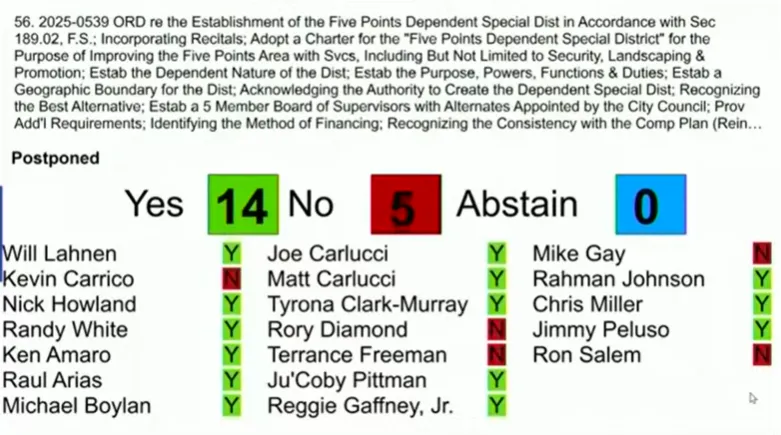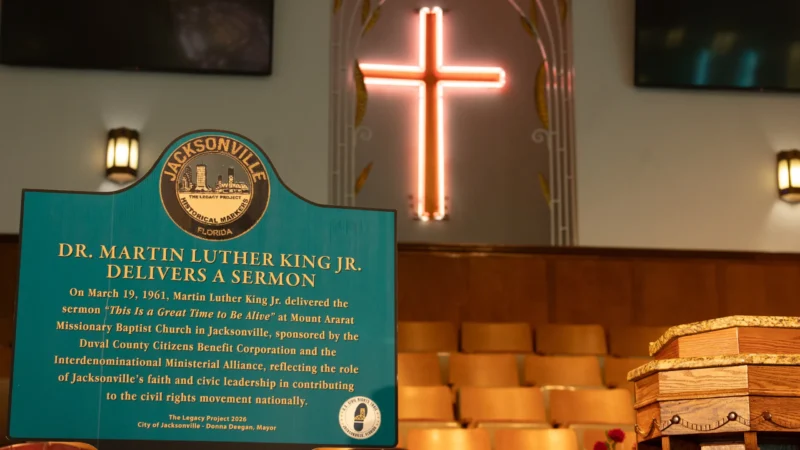Seth Darmata has spent his entire adult life in Five Points. He and his wife, Cassidy, bought their house there in the Riverside neighborhood’s business district.
And when they wanted to follow in the entrepreneurial footsteps of their parents and open a business, Darmata says Five Points was where they wanted to be.
It’s been 2½ years since the Darmatas opened their ice cream shop, Waffle Cone, on Post Street. Seth Darmata told Jacksonville Today that they felt quickly embraced by the business community and neighborhood regulars.
But, like many business owners, Darmata wants to see improvements in safety and beautification that until recently the 28-year-old says have been lagging.
“We were welcomed in and really got to meet everybody and loved the area, but we all had these common problems in the area that we were all trying to overcome there individually,” Darmata said.
Since mid-2023, those conversations have become more organized. Neighborhood merchants’ group the Five Points Association, property owners, and Jacksonville City Council member Jimmy Peluso held 14 community meetings about forming the Five Points business improvement district to pay for more security, walkability and beautification projects in the area.
“So once we all got together and started having these merchant meetings this idea was proposed,” Darmata said.
On Tuesday, the Jacksonville City Council voted 14-5 to approve Ordinance 2025-0539 giving a green light to establishing the charter of what’s officially called the Five Points Dependent Special District.
The bill allows an appointed board comprising Five Points commercial property owners, business owners and one association member appointed by the City Council president and mayor to set a budget that can pay for private security for the neighborhood, community projects and events.
The district is funded by a special assessment of commercial property within the district’s boundaries. The board could tax a maximum 55 cents per heated square foot of a commercial property and maximum 50 cents per square foot on commercial parking lots for the first year. The district’s board could set that lower.
For example, if you have a 1,000-foot retail space, the extra charge would be $550. And there are caps. According to the bill, the assessment can be increased annually by no more than $1 per heated square foot on each commercial property. On parking lots, the increase to the annual assessment cannot exceed $0.50 per square foot.
“We did a lot of one-on-one meetings with folks who were kind of tepid on it or who were kind of confused about why the city and (the Jacksonville Sheriff’s Office) and our arborists aren’t doing more,” Peluso told Jacksonville Today before the vote. “(We said) what we’re providing here are enhanced services and here’s what they look like.”
District needs
Many of the improvement district’s stakeholders want the future board’s focus to be security.
Casey Roth, vice president of Five Points Association and development manager for Riverside Avondale Preservation, says that means contracting with a private security company or off-duty police officers to supplement patrol from the Sheriff’s Office.
Association leadership used the private security patrolling San Marco Square and the Riverside Arts Market as an example during stakeholder meetings of how it could work in Five Points.
Roth says those patrols can handle things like loitering, be a deterrent to burglary or address a persistent issue of unlicensed vendors who set up outside vacant Five Points’ storefronts.
About a week before Tuesday’s final council vote, Five Points businesses, including Sake House and Brew Five Points, experienced a series of break-ins. Jacksonville Today news partner News4Jax reported $3,000 in property damage after the glass at Brew Five Points was shattered.

“We have to increase walkability, beautification and security to make sure that the mom with her two kids feels safe walking around the area. So I am more than happy to pay several hundred dollars a year,” Darmata told Jacksonville Today.
“That’s even if the whole thing was passed down to me. I would sign up for that right now because I guarantee you I’m losing way more money by people not coming that should be able to come.”
Roth says what the association doesn’t want are scenes that came with increased law enforcement presence in Five Points as in 2023 in an attempt to decrease crime at night.
“It was costly,” Roth said. “What we do want is, if we just had a person that was around that one of our shops just had on speed dial to say, ‘Hey, I feel uncomfortable right now. Can you come by?’ Maybe the person can de-escalate a situation. Whereas right now, a lot of the time our folks can only call the nonemergency number. They’ll call JSO and it takes awhile.”
The Five Points improvement district’s model is a relatively novel concept in Jacksonville, Peluso says. But in larger Florida counties and across the U.S., these types of districts have grown in use. The largest program is in New York City, which has 75, according to the U.S. Department of Transportation Federal Highway Administration.
The closest example in Jacksonville is the nonprofit business group Downtown Vision Inc., which assesses a 1.1-mill commercial property tax and receives donations to fund services and events on the Northbank and Southbank.
The Five Points improvement district board could also pay for public art like murals and to expand Five Points’ ambassador program. Ambassadors pick up discarded waste, empty trash cans and act as guides and greeters to visitors. It’s similar to Downtown Vision’s ambassadors program, which keeps the sidewalks and streets clean in the Downtown Northbank and Southbank.
Roth says the association currently has only enough money to employ one ambassador.
“That’s all we can afford. We did just get a grant from the city that’s going to supplement that, but we do want to evolve it into multiple ambassadors, multiple (work) shifts,” he said.
Perceived pros and cons
Council members who voted against the district’s creation Tuesday said they were concerned about levying a new tax on commercial properties without 100% buy-in from all the affected owners.
Peluso and improvement district advocates struck a compromise last week with the council’s Finance Committee allowing the owners of 11 properties who objected to the assessment to opt out.
In total, there are 94 commercial properties in the district’s boundaries, but Peulso says there are more than 200 that could benefit from the enhanced services when residential properties are counted.
Council members Ron Salem flipped his committee vote from yes to no on Tuesday. His concern stems from the city attorney’s assessment that a broader opt-out option for any property owner could lead to legal challenges from folks paying the assessment who feel like they’re carrying too much of the improvement district’s financial load.
That was ultimately cut from the final bill. But a property owner could petition council annually to change the district’s charter and be removed from the assessment. There is a similar rule in a special dependent district created in 2019 for single-family homes in Baymeadows.

Council member Rory Diamond said he opposed any additional tax on commercial properties that could be passed down to the business owners through increased rents.
“As soon as those bills go out and people start to get them, they’re going to start lining up here and say, ‘No, not me,’” Diamond said.
Darmata says, for Waffle Cone, the added security is worth that cost.
“Even if the landlord pays it and then inevitably that’s passed down into my rent when we go to renew, it’s worth it for me,” he said. “Who knows how much money as a business owner we’re losing because certain people say I’m not going to go to Five Points. Instead, I’m going to San Marco or Avondale.”
Peluso’s office conducted a canvas of property owners to gauge their support or opposition before the bill was considered. In addition to the 11 no’s, about 30 property owners did not respond to the survey.
“It’s why Year 1 is going to be so important because I think people will see the benefit and the value-add and say, ‘Maybe this is something I would like to be a part of,’” Peluso said.
Darmata says he wanted to see a three- to five-year lifespan for the improvement district so it doesn’t outlive its value. According to Peluso, it has a 10-year expiration.
Proponents of improvement districts say it has added benefits like increased property values. Roth says that the district-enhanced service could increase property values by as much as 15% in Five Points.
A May 2019 report from the University of California at Berkeley Goldman School of Public Policy says the estimate could come with caveats.
The report cites a NYU Furman Center study that says the estimated 15% property value increase over 10 years linked to business improvement districts came from larger districts in dense parts of Manhattan. The study found that mid-sized and smaller districts had “no discernible impact on various community indicators.” But the report notes that the NYU sample size was small and isolated to 44 districts in New York.
The first year
Five Points commercial properties owners will not see the new assessment until November 2026.
In the meantime, Peluso says he’ll use $150,000 of the $1 million allotted to his City Council district in the city’s Community Benefits Agreement with the Jacksonville Jaguars in the stadium renovation deal as seed money for the Five Points improvement district.
Peluso also told Jacksonville Today that he’s in discussions with Corner Lot Development Group and other larger commercial players with a presence in Five Points to also contribute first-year funding.
Over the next several months, the City Council president will appoint three of the district’s board members and two alternates and the mayor will appoint the two others and final alternate. The seed money will be used by the eventual board to set an initial budget and need to be reported to city officials by March.
In the last year, Five Points has seen some storefronts go dark like craft beer pub Alewife, the music venue and bar Rain Dogs, and the recent announcement that Mossfire Grill will close Nov. 9 after 27 years.
The iconic movie theater Sun-Ray Cinema also closed in 2024 and was replaced in May by the music venue FIVE.
Peluso admits there are economic factors and cultural shifts that affect areas like Five Points that a business improvement district and city cannot control.
“Some people are really scared about the future of Five Points because it’s losing its — kind of — funkiness and other people are scared of Five Points from the perspective of safety. Some people want to see more structure and groups coming together to keep the neighborhood alive and other people want to see the grungy neighborhood bar feel and that funky neighborhood shops feel,” Peluso said.
“It’s not going to solve the massive market forces or the change of where the investors are looking when it comes to Jacksonville,” he said. “And I can’t stop that. What I can do is work to make people’s lives and the business owners who are there see a light at the end of the tunnel.”







